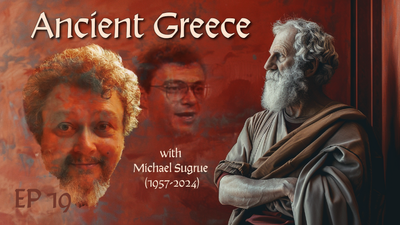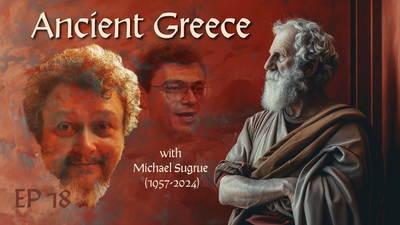In this week’s exploration, we delve into the heart of Plato’s metaphysical vision—his Theory of Forms. For Plato, reality is not limited to the tangible world that we perceive with our senses. Instead, he argues that the true essence of everything lies in a higher, intelligible realm of unchanging Forms. Take, for instance, the Form of Beauty. While we may encounter beautiful objects, people, or experiences, each of these only partakes in the greater, ideal Form of Beauty. This philosophical perspective challenges us to look beyond mere appearances and to seek out the true essence of what we value.
Plato’s Theory of Forms isn’t just an abstract concept but a guide for living. Imagine how our understanding of justice or goodness changes if we strive to perceive them as unchanging ideals, instead of merely the fluctuating interpretations society often offers. This shift in perspective is not just an intellectual exercise; it reorients our actions and decisions in the search for what is genuinely Good and Just.
We invite you to consider how Plato’s exploration of reality might apply to our contemporary lives. What if we aimed for the ideal in our relationships, work, or communities? Would it lead us to cultivate virtues and principles that elevate the quality of our lives? At planksip.org, you can share your thoughts on how the search for these ideals resonates in modern contexts and connect with others pursuing a life of meaning and wisdom.
From the Archives of Ancient Greece: Featuring Dr. Michael Sugrue
Dr. Michael Sugrue’s commentary on Plato’s Theory of Forms is both insightful and deeply engaging. He compares Plato’s Forms to eternal blueprints that shape the imperfect copies we experience in our everyday lives. Just as an architect refers to a design plan when constructing a building, Plato’s philosopher seeks the Forms to construct a life of virtue. Sugrue’s analysis emphasizes that, for Plato, understanding these abstract realities was not just about gaining knowledge but about transforming the soul.
In his lectures, Dr. Sugrue often uses the metaphor of sunlight and shadows to bring Plato’s vision to life. Just as the sun illuminates objects, making them visible, the Form of the Good illuminates all other Forms, making them understandable. Sugrue pushes us to contemplate the implications of this idea: without the Form of the Good, our grasp of truth and reality remains dim. Imagine trying to understand friendship, justice, or love without aiming for their higher, ideal Forms—what would our lives look like if we only pursued shadows of these concepts?
If you want to dive deeper into these themes, Dr. Sugrue’s full commentary is available on planksip.org. It’s a place where ancient ideas are not only preserved but actively reimagined for modern life. Join the conversation and explore the wisdom of the ancients with a community dedicated to seeking philosophical truths.
Insights from the Dialogues: Quoting Plato
Plato’s Republic offers one of the most famous expressions of his Theory of Forms in Book VI (508d-509c), where he introduces the Form of the Good. Plato likens this highest Form to the sun in the Allegory of the Cave. Just as the sun allows us to see and understand the visible world, the Form of the Good enables our intellect to perceive all other Forms. But what does this mean in practical terms? Think of the Form of the Good as the ultimate blueprint of truth, a guiding light that not only informs our moral decisions but also grounds our understanding of reality.
In contemporary terms, the Form of the Good could be seen as a guiding principle or an ideal that we strive to embody in our daily actions. For example, a leader in any organization who aims to act with integrity might use the idea of Goodness as a benchmark to evaluate their choices. Are their decisions in line with this higher ideal? Or are they merely expedient? This question echoes throughout the pages of The Republic, inviting us to seek what is true, beautiful, and good in all our endeavors.
Exploring Plato’s dialogues is not just an intellectual journey but a deeply practical one. By engaging with these ideas, we find a framework for pursuing a virtuous life, grounded in higher ideals. If you are interested in how these ancient principles can shape your modern life, consider joining the discussions at planksip.org, where members explore and personify these timeless ideals.
Chance and Fate: Exploring Ancient Games
Ancient Greeks believed that games like knucklebones and dice held more than just entertainment value—they were symbolic interactions with fate. The rolls of knucklebones, known as astragali, were often associated with divine will or luck, offering participants a glimpse into the uncertainties of life. In a society where the gods were seen as active agents, the outcomes of these games were not just about probability; they were reflections of cosmic order and human agency.
Explore the Mystical World of Astraguli: Ancient Games of Chance with Cultural Significance.
Plato’s understanding of the Forms provides an interesting parallel. Just as these ancient games allowed players to interpret their luck as a reflection of divine patterns, the Theory of Forms invites us to interpret reality as a reflection of higher truths. For instance, when we observe the concept of Justice in a courtroom or debate the ethics of a political decision, we can think of ourselves as attempting to align with a greater, ideal Form of Justice. The ancient games and Plato’s Forms both invite us to consider our relationship with an order beyond our immediate perception.
The symbolism of these games resonates today. Just as the ancient Greeks used dice to interact with fate, we, too, find ourselves navigating uncertain outcomes in life. If you’re curious about these metaphors and how they connect with Plato’s ideas, visit planksip.org to explore these themes further with like-minded individuals.
Virtues Revisited: Practical Lessons for Today
This week, we revisit the virtue of Prudence in light of Plato’s Theory of Forms. In ancient Greek thought, Prudence (or practical wisdom) is not simply about making the right decisions; it’s about seeing beyond immediate circumstances to align one’s choices with higher ideals. Prudence guides us in perceiving what is genuinely Good, Beautiful, or Just and applying that understanding to our actions.
Imagine a leader faced with a critical decision, torn between public opinion and what is ethically right. A prudent leader would pause, reflect on higher principles, and act in alignment with those ideals, much like aiming for the Form of the Good in Plato’s philosophy. This connection between ideals and practical actions echoes throughout Plato’s dialogues, challenging us to think deeply about how we live and lead.
We encourage you to reflect on the role of Prudence in your own life. Are you making decisions aligned with what you believe is truly Good? If you’re interested in exploring how this virtue can guide your life, join the conversation at planksip.org, where members discuss and embody these ancient principles in today’s world.
Engage with Us: Reader’s Corner
How do you interpret the idea of abstract Forms in your life? Have you encountered moments where ideals shape your understanding of the world? Share your reflections with us, and your insights may be featured in our next newsletter. Participating in these discussions not only deepens your understanding but also connects you with a community of thoughtful individuals who share your passion for wisdom.
Closing Reflection: Socrates’ Enduring Legacy
Socrates’ commitment to the pursuit of truth led him to question the nature of reality itself. He didn’t merely seek to understand the physical world but strove to grasp the higher, eternal Forms that shape our understanding of life. His dedication to these ideals, even at the cost of his life, reminds us that the pursuit of wisdom is not just an intellectual endeavor—it’s a way of being.
Socrates’ journey invites us to contemplate the eternal and seek wisdom beyond the fleeting distractions of everyday life. At planksip.org, we strive to continue this journey, bringing together those who seek to live lives guided by higher ideals and meaningful conversations. Join us and let the legacy of Socratic wisdom inspire your own pursuit of truth.

Plato Re-Imagined
This course offers 32 comprehensive lectures exploring most of Plato's dialogues. These lectures guide students toward a consilient understanding of the divine—a concept that harmonizes knowledge across disciplines and resonates with secular and religious leaders. As a bonus, Lecture #33 focuses on consilience, demonstrating how different fields of knowledge can converge to form a unified understanding.






